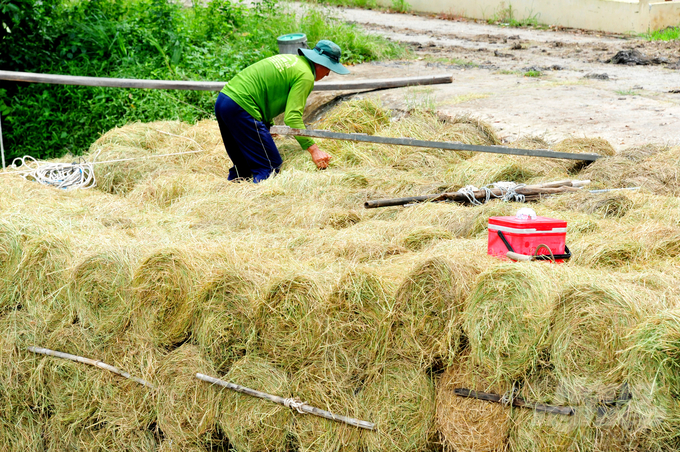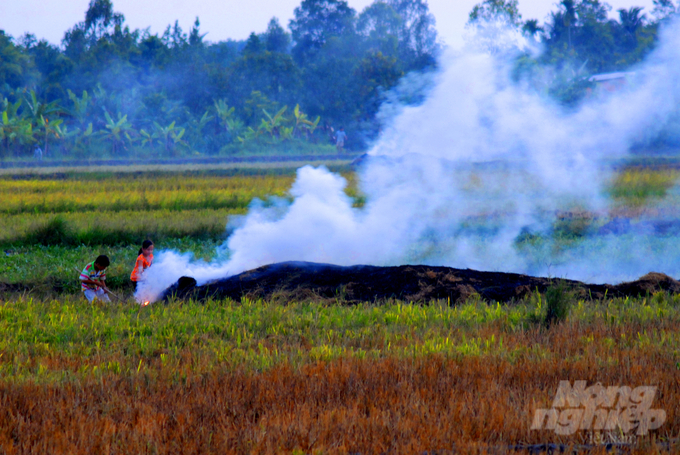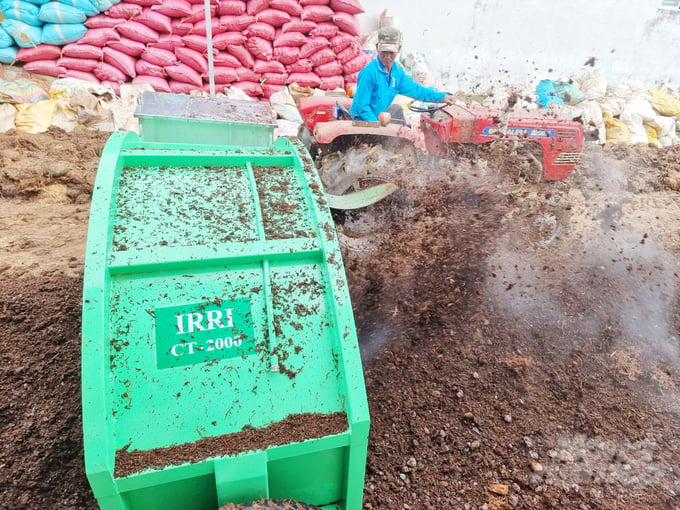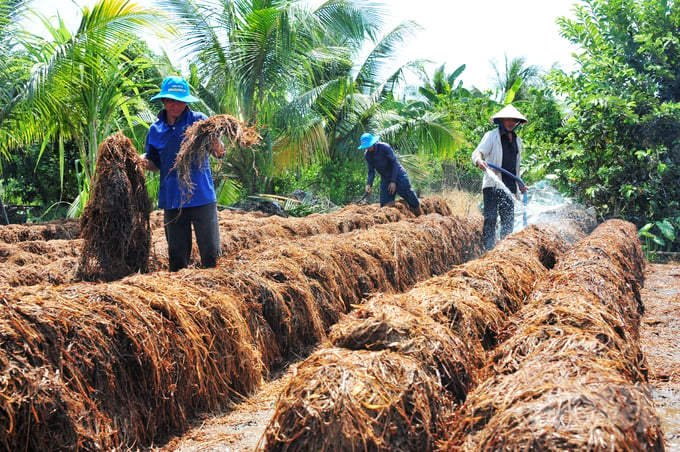May 28, 2025 | 15:50 GMT +7
May 28, 2025 | 15:50 GMT +7
Hotline: 0913.378.918
May 28, 2025 | 15:50 GMT +7
Hotline: 0913.378.918

By-products of rice production not only create many products with high economic value but also create jobs for many rural workers. Photo: Le Hoang Vu.
In addition to generating numerous high-value economic products, the recycling of agricultural by-products also generates employment opportunities for numerous rural workers, enhances the incomes of farmers, and contributes to environmental preservation.
In the Mekong Delta, where an annual cultivation area of over 4 million hectares of rice is present, the conversion of rice straw into organic fertilizer has been demonstrated to save producers approximately 1.4 million tons of NPK fertilizer. This has been demonstrated in numerous scientific studies.
Agricultural experts have determined that the processing of rice chaff into organic fertilizer during the harvest of 1 hectare of rice will return to the soil nutrients equivalent to 100 kg of nitrogen fertilizer, 50 kg of phosphate fertilizer, and 200 kg of potassium fertilizer. Nevertheless, the majority of this by-product has been disposed of or incinerated for an extended period, resulting in soil degradation and environmental damage.

Although the authorities have stepped up communication and advocacy work, many Mekong Delta farmers still burn straw in the fields. Photo: Le Hoang Vu.
Despite the fact that authorities have implemented communication and mobilization initiatives, numerous farmers continue to burn paddy straw in their fields, resulting in numerous adverse effects.
Mr. Tran Minh Tri, a farmer in Dinh Mon commune (Thoi Lai district, Can Tho city), stated: "I and many other farmers in this field have long had the habit of burning fields to kill fungi and harmful insects still hiding in the rice straw. This was in reference to the fact that he was preparing the soil for re-sowing the summer-autumn crop by burning over 1 hectare of his family's rice field along provincial road 922. Additionally, I believe that the burning of fields generates a specific quantity of ash fertilizer from rice chaff for the subsequent rice crop."
Ms. Pham Thi Minh Hieu, the Head of the Plant Protection Department in Can Tho city, recommended that farmers plow and combine the rice straw into the soil at the beginning of the dry season to prepare the soil for the summer-autumn rice crop. This is a cost-effective and effective method that increases the thickness of the cultivation layer, thereby restoring fertility to the soil. During the stormy season, producers can also remove the rice straw from the field to convert it into organic fertilizer for crops, thereby reducing costs and mitigating the effects of climate change.
In recent years, the introduction of straw rolling machines has not only contributed to the development of numerous rural industries but also increased the income of rice cultivators by 600-700 thousand VND/ha through the sale of straw. The straw mushroom cultivation industry in the Mekong Delta has experienced significant growth as a result of a consistent straw source. This method is effective in that it not only increases the income of numerous families, but the decomposed straw that remains after mushroom cultivation is processed into organic fertilizer for crops.

Currently, there are many technologies for producing high-quality organic fertilizer from straw. Photo: Le Hoang Vu.
According to Associate Professor Dr. Nguyen Van Hung, an expert at the International Rice Research Institute (IRRI), the technology for producing organic fertilizer from straw is essential for maintaining both quality and affordability. Organic fertilizer helps to improve the quality of agricultural products and improve the soil. The distinctive feature of this technology is the integration of biochemical and mechanical processes to enhance the quality of organic matter and the decomposition of straw.
In addition to generating value from rice straw, the use of straw for decomposing organic fertilizer also contributes to the reduction of greenhouse gas emissions when compared to the burying of straw after the rice harvest. Additionally, sustainable rice production standards necessitate refraining from burning stalks in the field, which not only enhances income but also safeguards the environment, thereby aligning with the trend of agricultural development toward organic methods.
Rice cultivation not only affects the environment by utilizing land, water, fertilizers, and chemicals, but also by-products such as straw and husks, which, if not properly collected, can contribute to environmental contamination.
In Dong Thap, farmers have recently received education and training on how to utilize by-products from paddy production, such as collecting straw for mushroom cultivation. Furthermore, rice husks are employed to manufacture pellets for export, while straw is employed to compost organic fertilizers for agriculture.
Currently, numerous cooperatives (HTX) in Dong Thap are conducting training sessions for their members to educate them on the utilization of by-products from rice production. The primary focus is on the collection of straw for the purpose of mushroom cultivation. This is a practical and effective model that generates employment opportunities during off-peak farming periods, boosts income, and substantially reduces environmental pollution, thereby preventing organic toxicity in the subsequent rice crop.

Thanks to a stable source of straw material, straw mushroom farming is currently developing quite strongly in the Mekong Delta. Photo: Le Hoang Vu.
Mr. Tran Vu Hien, a supervisor at Phuoc Tien Agricultural Cooperative (Hong Ngu district, Dong Thap), stated that the cooperative operates on 2,600 hectares of rice, with 1,800 hectares being cultivated annually with three crops. The cooperative is presently investing in the construction of synchronized rice production facilities, including a 10km internal road network, electric pumping stations, flood gate barriers, and concrete water conduits.
Furthermore, cooperative members are provided with assistance from the provincial agricultural sector in the form of training on scientific and technical advancements, including "Three Reductions, Three Gains" and "One Must, Five Reductions." This assistance has resulted in a 30% reduction in the cost of seeds, fertilizers, and plant protection chemicals in comparison to traditional cultivation.
For numerous years, the cooperative's producers have been exceedingly satisfied and more assured as a result of an effective irrigation system. The cultivation of rice within flood protection dikes provides farmers with a sense of security, as they are no longer concerned with inundation. Additionally, the cooperative promotes the utilization of straw by farmers, who collect it to cultivate mushrooms instead of selling or burning it, thereby boosting their income. The decayed straw and Trichoderma biological products are composted by farmers into organic fertilizer for their fruit trees and vegetables after the mushrooms have been grown.
Rice is the primary commodity in Vietnam, and it generates an estimated 46 million tons of straw annually following harvest. The Department of Crop Production (Ministry of Agriculture and Rural Development) has determined that an equivalent quantity of chaff remains in the fields for each ton of rice produced. If not managed properly, the substantial quantity of straw that remains unutilized poses a threat to environmental pollution, effects the production of the subsequent rice crop, and poses concerns for storage sites.
Translated by Linh Linh

(VAN) The mutual export of agrifood products between the European Union (EU) and the United Kingdom (UK) must occur again without certification, border controls or other red tape. This was agreed at the UK-EU summit.
/2025/05/22/5121-2-173645_677.jpg)
(VAN) NBSAP Tracker identifies strengths and areas for improvement in the National Biodiversity Strategy, based on each region’s priorities and capacities.

(VAN) The draft amendment to the Circular on rice export trading stipulates a periodic reporting regime for rice exporting enterprises.

(VAN) Dong Thap farmers attained an average profit margin of 64% during the summer-autumn 2024 crop (first season), while An Giang and Kien Giang farmers followed with 56% and 54%, respectively.

(VAN) As a doctoral student doing research on renewable energy and electrification at Harvard University, the author shares his musings on electricity, nature, and countryside memories.

(VAN) The decree on Extended Producer Responsibility (EPR) ensures transparent management and disbursement of support funds, avoiding the creation of a “give-and-take” mechanism.

(VAN) Hue City rigorously enforces regulations regarding marine fishing and resource exploitation, with a particular emphasis on the monitoring of fishing vessels to prevent illegal, unreported, and unregulated (IUU) fishing.